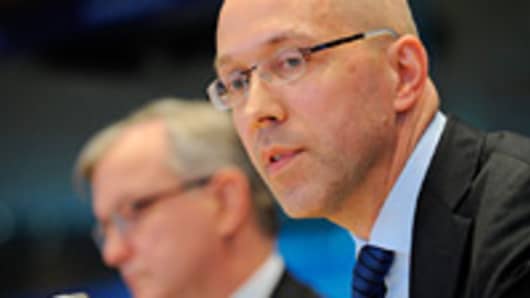The European Central Bank will stick to its expansive monetary policy for as long as necessary though it should be wary of dropping its deposit rate below zero, Executive Board member Joerg Asmussen said on Monday.
"Our monetary policy is expansive and will remain so as long as necessary. But to keep rates low for too long would create new risks," Asmussen said in a speech.
Federal Reserve Chairman Ben Bernanke unnerved markets last Wednesday by saying the U.S. central bank might soon scale back its stimulus program.
(Read More: Draghi: 'We Need More, Not Less Europe')
Asmussen said the ECB should tread cautiously on the idea of taking its deposit rate into negative territory, which would mean the bank charging commercial lenders for holding their money overnight. ECB President Mario Draghi has said the bank was "technically ready to do this".
"Some see the discussion very openly, I see it less openly," Asmussen said.
Such a move could encourage banks to lend out money to the real economy rather than hold it at the ECB, though it could also have implications for banks' own operations and for funding and bond markets.
While non-euro zone member Denmark has dabbled with negative deposit rates, the ECB would be the first major central bank to use the measure.
Don't Meddle With Growth Pact
On fiscal issues, Asmussen said it would be "the wrong path" for governments to exclude certain investments from budget deficit calculations. Some EU governments want public investments excluded to help them meet fiscal targets.
(Read More: Grexit No Longer Likely, Says Man Who Coined Phrase)
Asmussen said the European Union's Stability and Growth pact already allowed for fiscal flexibility, for example in giving countries more time to reach deficit goals if they can prove they are making progress, but this should not be abused.
The European Commission is expected to confirm on Wednesday that France, Spain and Slovenia will be granted more time to get their budget deficits down to the pact's limit of 3 percent of economic output.
"I do not think you should tinker with the growth pact," Asmussen said, noting that countries still had to finance these investments on the capital markets at high interest rates which would make it more difficult for them to balance their budget in the long run.
Asmussen, who worked for many years in the German finance ministry, said German economic growth would be "considerably better" in the second quarter than in the first but it needed to carry out reforms if it wanted to avoid becoming the "sick man of Europe" again.
(Read More: ECB Can Expand Its Tools to Fight Crisis)


